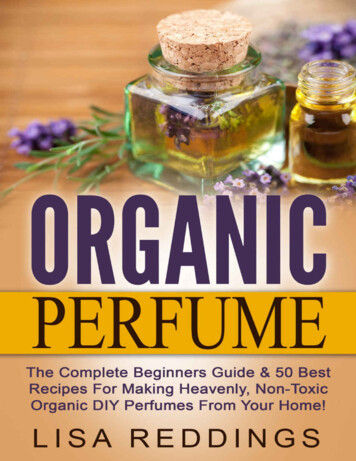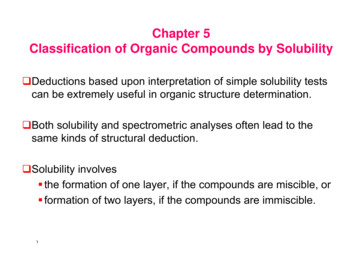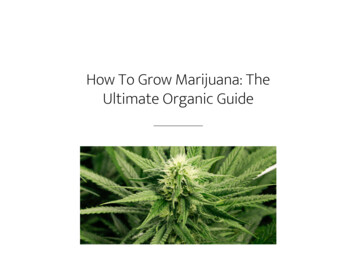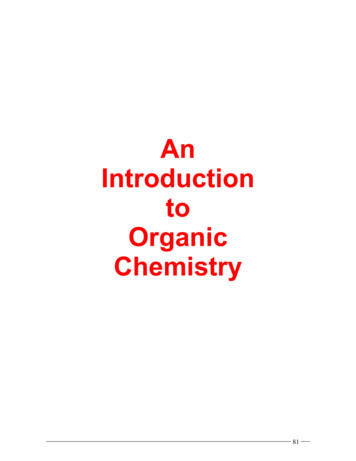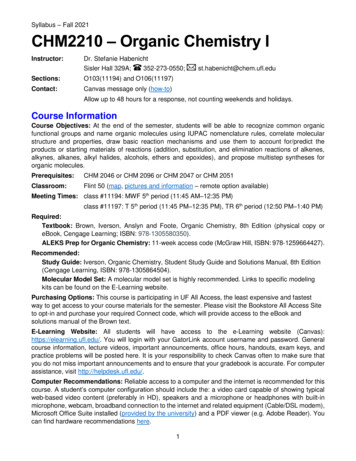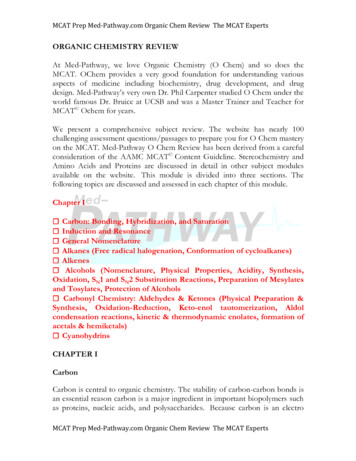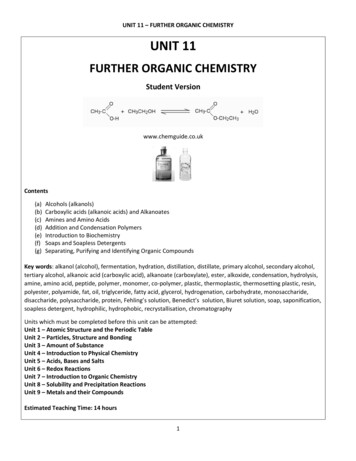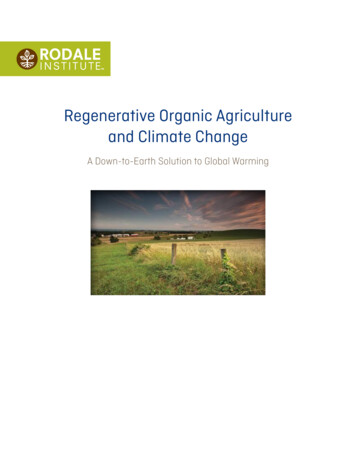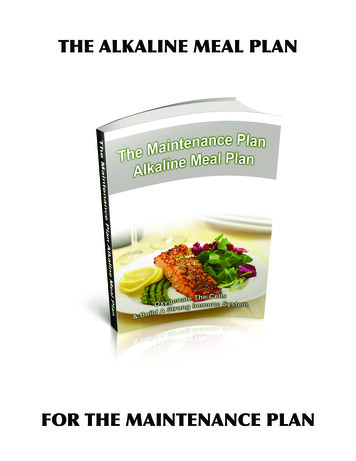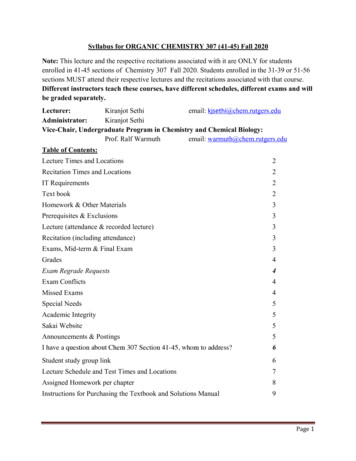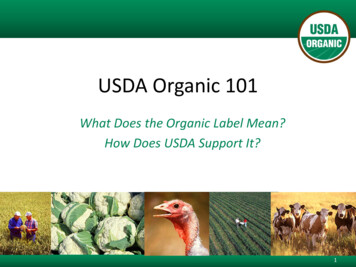
Transcription
USDA Organic 101What Does the Organic Label Mean?How Does USDA Support It?1
Topics1. The Growing Interest in Organic2. The Meaning of Organic3. Organic Requirements4. Organic Certification5. Resources for USDA Customers2
Learning ObjectivesThe Organic 101 module: Provides an overview of theUSDA Organic label Explains the meaning of organicand the certification process Describes USDA resources fororganic producers and others3
How Big is the Organic Market? The organic industry is experiencing significantgrowth: in 2010, the organic industry grew toover 28.6 billion in U.S. retail sales* Demand is expected to continue to grow steadilyinto the future: with 7.7% growth during 2010,organic food outpaced the growth of total foodsales* Organic farm acreage more than doubled from1997 to 2005***Organic Trade Association 2011 Organic Industry Survey **USDA Economic Research Service Organic Briefing Room, 20094
What Can Be Called USDA Organic? All agricultural products sold, labeled, orrepresented as organic in the United Statesfall under USDA jurisdiction Any food, feed, feed input, or fiber sold orlabeled as organic in the U.S. must followUSDA organic regulations There are four categories of certification:– Crops– Wild Crops– Livestock– Handling (defined as selling, processing,or packaging)How Do I Know if aProduct is Organic?Look at the label. If it has the USDAorganic seal, the product is certifiedorganic and has 95% or moreorganic content.For multi-ingredient products, if thelabel lists specific organicingredients, those ingredients havebeen certified organic.5
Who Sets the Standards for theUSDA Organic Label? The USDA National Organic Program (NOP):– Develops regulations or “standards” fororganic crop, wild crop, and livestockproduction and handling– Ensures enforcement of the regulations– Is authorized by the Organic FoodsProduction Act of 1990– Is part of USDA’s Agricultural MarketingService Visit the NOP! www.ams.usda.gov/nop View organic regulations: df/CFR-2011-title7-vol3-part205.pdf6
What Does It Mean to be an Organic Farmer? Environmental stewardship: Organic farmers mustuse practices that foster cycling of resources,promote ecological balance, and conservebiodiversity Synthetic substances: Organic farmers limit theiruse of synthetic fertilizers and pesticides to thoseapproved in organic regulations and do not usesewage sludge, irradiation, or genetic engineering Pest management: Organic systems requirepreventative measures and physical controlsbefore using approved pesticides Fertility and nutrient management: Organicsystems focus on developing soil in ways that relyon natural materials7
What Does It Mean to be an Organic Handler? Organic handlers process, package, or store organic agricultural products. Organic handlers modify agricultural products using methods that complywith organic regulations (such as: cooking, baking, curing, drying, mixing,grinding, churning, separating, distilling, extracting, slaughtering,fermenting, dehydrating, freezing, packaging, canning, etc.) Organic handlers must protect organic products from:– Contamination by prohibited substances– Commingling with nonorganic products8
What Lands May Be Certified as Organic? To be eligible for certification:– Land must have been free of prohibitedsubstances for 3 years– If the land has been free of prohibitedsubstances for at least 3 years, theoperation may be eligible forimmediate certification Both conventional and organic productionmay occur on the same farm Buffer zones may be required, if prohibitedsubstances are used on adjacent lands There are no size requirements—bothsmall and large farms are eligible for organiccertificationWhat is a ProhibitedSubstance?The USDA organicregulations specify whichsubstances are allowedand prohibited in organicproduction and handling.Producers and handlersshould refer to the USDAorganic regulations forspecific information.9
Who Certifies Organic Operations? The USDA NOP does not certify organic operationsdirectly but instead, accredits third-party certifyingagents to review, inspect, and approve organic producersand handlers Certifying agents may be private entities, states, orforeign governments All certifying agents are monitored by the USDA Certifying agents verify that organic farms and processingfacilities meet the USDA organic standards There are over 90 certifying agents around the world,with more than 50 in the United States Producers and handlers may work with any certifyingagent they choose Certifying agents grant organic certificates to compliantproducers and handlers so that they can market and selltheir products as organic10
How Do Producers and HandlersApply for Certification?The Producer or Handler:1. Selects a certifying agent from a list on theNational Organic Program website:www.ams.usda.gov/nopacas2. Prepares an application, using instructions fromthe certifying agent— Applications include an organic system plan(OSP), which describes the type of operationand organic products produced, as well aspractices and substances used in productionFor more information, see “5 Steps to Certification”In the NOP Program Handbook:www.ams.usda.gov/NOPProgramHandbook11
How Does a Certifying Agent ApproveCertification for Producers and Handlers?The Certifying Agent:1. Reviews the organic system plan to determinewhether the operation can comply with the organicregulations2. Sends an inspector to conduct an on-site inspectionof the operation3. Reviews the inspector’s report, along with theorganic system plan4. Issues an organic certificate to compliant operations12
Are There Different Rules for Small Operations? There is an exemption to the certificationrequirements:– Operations grossing less than 5,000 a year fromorganic products do not have to be certified– These are called exempt operations Exempt operations MUST follow all USDA organicproduction requirements to represent theirproducts as organic Exempt operations are not required to submit awritten Organic Systems Plan for acceptance orapproval, nor are they required to pay certificationfees to a certifying agent13
How Does a Certified Operator Stay Certified? Operators submit an annual update of theirorganic system plans and pay annualcertification fees Certifying agents conduct annual inspectionsof each certified operation Certified operators keep certification-relatedrecords concerning the production, harvesting,and handling of organic products for 5 years Intentional violations of the NOP regulationscan result in the loss of certification, and finesof up to 11,000 per violation Members of the public who suspect noncompliance may submit a complaint to theNOP: www.ams.usda.gov/NOPFileaComplaint14
How Does the USDA Support Organic? Many USDA programs support organic producers and handlers Some are specifically targeted to organic agriculture Others are not targeted to organic agriculture, but all USDA programsare open to organic producers and handlersThe next four slides describe specific programs* that maybenefit organic producers and handlers.* As of June 2012.15
How Does the USDA Support Organic?The following USDA resources aregrouped in categories that correspondwith the USDA Organic Resource Guide16
What USDA Programs DirectlySupport Organic Producers? The NOP’s Organic Cost Share Program can help reimburse eligible producersand handlers for up to 75% of the cost of organic certification (up to 750). NRCS programs such as the Environmental Quality Incentives Program Organic Initiative,the Conservation Stewardship Program, and Agricultural Management AssistanceProgram provide technical and financial assistance for producers to assist in implementingconservation practices, some of which can help meet organic certification requirements. Farm Service Agency programs such as the Conservation Loan Program and the TransitionIncentives Program give priority to those planning to use organic or sustainable farmingpractices. The Risk Management Agency (RMA) offers Organic Federal Crop Insurance for all cropsgrown under the organic farming practice, provided they meet standard terms andconditions. RMA publishes separate organic prices for corn, cotton, processing tomatoes,soybeans and avocados, but for all other crops, the prices are the same as those grownusing conventional means. USDA’s Market News (AMS) reports organic prices and movements at shipping points,wholesale terminals, and retail outlets for organic fruits & vegetables, dairy, grain &feedstuffs, and poultry & eggs.17
Where Can I FindInformation on Organic Agriculture? USDA’s National Agricultural Statistics Service (NASS) and Economic ResearchService (ERS) collect and analyze data on organic production and management. USDA’s Agricultural Research Service (ARS) supports organic agricultural researcharound the country, particularly through its Natural Resources and SustainableAgricultural Systems programs. Search ARS’s website to learn more about suchprojects and the scientists doing them. USDA’s National Agricultural Library is home to the Alternative Farming SystemsInformation Center, which provides information on many aspects of organicagriculture. The eOrganic online community of scientists and practitioners offers a wealth ofinformation on organic agriculture, including articles, webinars, videos, and “Ask theExpert.”18
Where Can I Find Funding forOrganic Research and Education?USDA’s National Institute of Food and Agriculture (NIFA) supports the followingcompetitive grants: The Organic Agricultural Research and Extension Initiative and Organic TransitionsProgram fund research, extension, and education activities of organizations workingon critical organic agriculture issues. Sustainable Agricultural Research and Education (SARE) grants are managed byregional councils to encourage site-specific experimentation that pushes theboundaries of current thinking. Many have focused primarily on organic production ormarketing in the past. Unlike other NIFA grants, producers are among those eligible. Beginning Farmer Rancher Development Program funds organizations who train,educate, and provide technical assistance to beginning farmers.19
How Can I Fund Organic Marketing & Infrastructure? Visit a nearby USDA Rural Development (RD) office for information on grantsand loans such as:– Value-Added Producer Grants for planning activities or working capital to marketvalue-added agricultural products.– Business & Industry Guaranteed Loans to improve, develop, or finance business,industry, and employment, and improve the economic and environmental climate inrural communities. This purpose is achieved by bolstering the existing private creditstructure through the guarantee of quality loans.USDA’s Agricultural Marketing Service (AMS) offers:– Farmers Market Promotion Grants to organizations to improve and expand farmers’markets, roadside stands, community-supported agriculture (CSA) programs, agritourism activities, and other producer-to-consumer market options.– Specialty Crop Block Grants to State Departments of Agriculture, who then grantfunds to others to enhance the competitiveness of fruits, vegetables, tree nuts, driedfruits, horticulture, and nursery crops in their state.USDA’s Foreign Agricultural Service (FAS) helps U.S. producers (including organic),exporters, private companies, and other trade organizations finance promotional activitiesfor U.S. agricultural products through the Market Access Program.20
What Other USDA Resources ShouldOrganic Producers Know About? Visit a nearby USDA Farm Service Agency (FSA) office for the following:– Farm loans and loan guarantees for purchases related to farm operation or ownership.– Disaster assistance programs help producers recover from losses.– Conservation Programs help landowners protect eligible fragile croplands and grazing landsusing rental contracts, cost-share and incentive payments, or conservation easements. Visit a nearby USDA Natural Resources Conservation Service (NRCS) office for a wide range ofconservation programs that can help producers reduce soil erosion and build soil quality, plantcover crops and field borders, increase pollinator & wildlife habitat, mulching and more! USDA’s Food Safety and Inspection Service (FSIS):– Regulates meat, poultry, and egg products processing and product labeling, including the useof the organic label.– Runs the Small Plant Help Desk, where small meat, poultry, and egg product establishmentscan ask questions about agency regulations and obtain information about other food safetyresources: InfoSource@fsis.usda.gov or 1-877-FSISHelp (1-877-374-7435). The Small PlantHelp Desk is staffed Monday through Friday, 8 am to 4 pm, ET. USDA’s Animal and Plant Health Inspection Service (APHIS) is responsible for preventing theintroduction and spread of agricultural pests. APHIS strives to use a variety of methods, includingthose that can be used without impacting the status of organic products.21
Learn More: Internal Resources forUSDA Employees AgLearn Organic Traininghttps://aglearn.usda.gov– Organic 201 provides a deeper overview of organic certification, includingOrganic System Plans, the National List of Allowed and Prohibited Substances USDA Connect /organic– For USDA employees only. Organic Community Page contains answers to FAQs,links to helpful resources, and discussion boards22
Learn More:USDA Organic Resources For the Public USDA Organic Resource Guide– Provides information on USDA programs available to organic producers and handlers» www.ams.usda.gov/organicinfo National Organic Program Website– Outreach materials and public information about organic regulations– National List of Approved Substances and Petitioned Substances– List of certifying agents and certified operations» www.ams.usda.gov/nop Alternative Farming Systems Information Center at the National Agricultural Library– Provides resources about sustainable food systems and practices» afsic.nal.usda.gov/organic-production The NOP Organic Insider Newsletter– NOP’s regular e-mail service with updates and news on organic agriculture» http://bit.ly/NOPOrganicInsider23
Beyond USDA: Additional Resources National Sustainable Agriculture Information Service (ATTRA-NCAT): an onlineand phone resource, offering guidance in preparing for certification and inproduction methods for a range of organic crops and livestockattra.ncat.org/organic.html eOrganic: an extension online community dedicated to organic productioneorganic.info24
Support for Organic Across USDA“Organic agriculture is an important part of whatwe do at USDA. Every part of USDA has someresponsibility for supporting organic farmers andranchers. Thank you for taking the opportunityto learn this information, and for putting it togood use.”- Deputy Secretary Kathleen Merrigan25
– Runs the Small Plant Help Desk, where small meat, poultry, and egg product establishments can ask questions about agency regulations and obtain information about other food safety resources: InfoSource@fsis.usda.gov or 1-877-FSISHelp (1 -877-374-7435). The Small Plant Help Desk
